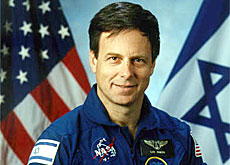Israel’s first astronaut – symbol of hope

Israel's first astronaut, Ilan Ramon, was a symbol of hope for his troubled homeland when he blasted off on January 16 aboard the space shuttle Columbia.
The apparent disaster has shattered hopes that Ramon’s involvement in the mission would serve as foil for much of the bad news that has beset Israel.
The participation of an Israeli on the 16-day flight saw security tightened during the flight – which was billed by NASA as a routine scientific mission.
“The government of Israel and the people of Israel are praying together with the entire world for the safety of the astronauts on the shuttle Columbia,” the office of the Israeli prime minister, Ariel Sharon said in a statement.
“The state of Israel and its citizens are as one at this difficult time.”
National hero
Ramon, 48, is an air force colonel and the son of a Holocaust survivor. His military career included the bombing of an Iraqi nuclear reactor in 1981.
He became a national hero overnight when Israel television carried live broadcasts of the liftoff from Cape Canaveral, Florida.
Ramon “is fulfilling everyone’s dream, to be the first Israeli in space,” Israel’s Channel Two commentator said just before Ramon and his six American crewmates lifted off.
Ramon’s wife Rona and their four children have been living in Texas for the past several years as he prepared for the flight.
They were at Cape Canaveral for the liftoff and were also there Saturday for the planned landing.
Ramon first began his preparations in 1997, and was a payload specialist. He spent much of Columbia’s 16-day flight aiming cameras in an Israel Space Agency study of how desert dust and other contaminants in Earth’s atmosphere affect rainfall and temperature.
In memory of the Holocaust
For a few days, Ramon’s journey diverted attention from the grinding conflict with the Palestinians.
The Israeli enthusiasm came partly from the fact that Ramon is one of the country’s top air force pilots, considered among the nation’s military elite.
Ramon was not particularly religious, but decided to eat kosher food in orbit _ the first time it was ever placed on a space mission.
“I’m secular in my background, but I’m going to respect all kinds of Jews all over the world,” Ramon said.
“For Israel and for the Jewish community, it’s a very symbolic event.”
Ramon, whose mother and grandmother survived the Auschwitz death camp, honoured those who endured the Holocaust by carrying a small pencil drawing titled “Moon Landscape” by Peter Ginz, a 14-year-old Jewish boy killed at Auschwitz.
swissinfo and agencies

In compliance with the JTI standards
More: SWI swissinfo.ch certified by the Journalism Trust Initiative








You can find an overview of ongoing debates with our journalists here . Please join us!
If you want to start a conversation about a topic raised in this article or want to report factual errors, email us at english@swissinfo.ch.